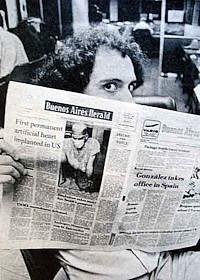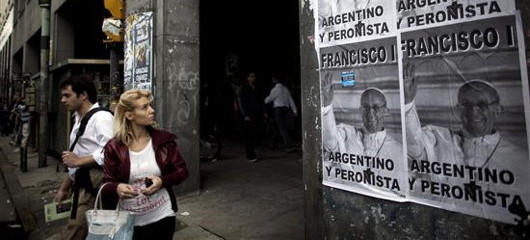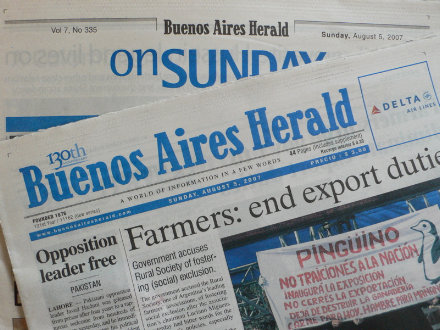Buenos Aires Herald
About Andrew Cusack
 Writer, web designer, etc.; born in New York; educated in Argentina, Scotland, and South Africa; now based in London.
Writer, web designer, etc.; born in New York; educated in Argentina, Scotland, and South Africa; now based in London. read more
News
Blogs
Reviews & Periodicals
Arts & Design
World
France
Mitteleuropa
Knickerbockers
Argentina
The Levant
Africa
Cape of Good Hope
Netherlands
Scandinavia
Québec
India
Muscovy
Germany
Academica
All Change for Argentine Newspapers
BsAs Herald emerges as weekly as La Nación goes tabloid

Not Lucas de Soto
One of the saddest pieces of news to hit the Cusackosphere in 2016 was word that the Buenos Aires Herald was ending its 140th year by moving from daily to weekly production. The English-language Herald has been a stalwart of its city and country and, though little known abroad, has ranked among the finest newspapers in the world. But from 2007, when Charleston’s Evening Post Publishing Company sold the Herald onwards to controversial businessman Sergio Szpolski, the paper found itself in increasingly chaotic situations. Robert Cox, Herald editor in the difficult period from 1968 to 1979, said what happened to the paper was “like a car crash”, and blamed the papers owners.
My favourite feature of the Herald was Martin Gambarotta’s weekly ‘Politics and Labour’ column — a witty and insightful peek behind the curtains of Argentine public life. Like Miriam Lord’s Dail sketches for the Irish Times, one wished it was possible to redeploy Gambarotta’s pen at will towards whichever corner of the globe one happened to be situated in.
As if that weren’t bad enough, the republic’s venerable broadsheet La Nación announced around the same time its conversion to a smaller compact size. The centre-right daily is the most prestigious in Argentina since the demise of La Prensa under Peronist persecution. While its weekend editions will maintain their broadsheet format, from Monday to Friday La Nación will be printed in a compact format similar in size to a tabloid.
Marcelo García’s explanation of the changes at the Herald can be found below. (more…)
Franciscan Ways

If God is an Argentine then, apparently, the pope is a Peronist. At least that, “a Peronist,” is how much of the local press has chosen to describe Argentine Cardinal Jorge Bergoglio, who on Wednesday was elected pope and took the name of Francis.
 MARTIN GAMBAROTTA
MARTIN GAMBAROTTABergoglio is a son of Buenos Aires. If you happened to stroll through Plaza de Mayo on any given day you could sometimes see Bergoglio preaching to his flock from the steps of the Buenos Aires Cathedral while life went on around him.
Plaza de Mayo has always been a historic place. Now visitors will want to take another look at the cathedral, which for years was the headquarters of who is now Pope Francis.
If Bergoglio’s appointment has redefined the way in which you will look at a building then imagine the effect it will have on the nation’s volatile politics.
Resident of Buenos Aires (aka porteño), now you know what global attention feels like.
The minute Bergoglio’s election was announced the telephones in newsrooms started to ring. (more…)
St. Alban’s College: 1907-2007

ASTUTE READERS OF the Buenos Aires Herald, itself over one hundred and thirty years old, would have noticed in the paid announcements section a week ago Sunday the following notification: (more…)
Search
Instagram: @andcusack
Click here for my Instagram photos.Most Recent Posts
- Waarburg October 2, 2024
- A Prize for the General September 23, 2024
- Articles of Note: 17 September 2024 September 17, 2024
- Equality September 16, 2024
- Rough Notes of Kinderhook September 13, 2024
Most Recent Comments
Book Wishlist
Monthly Archives
Categories


